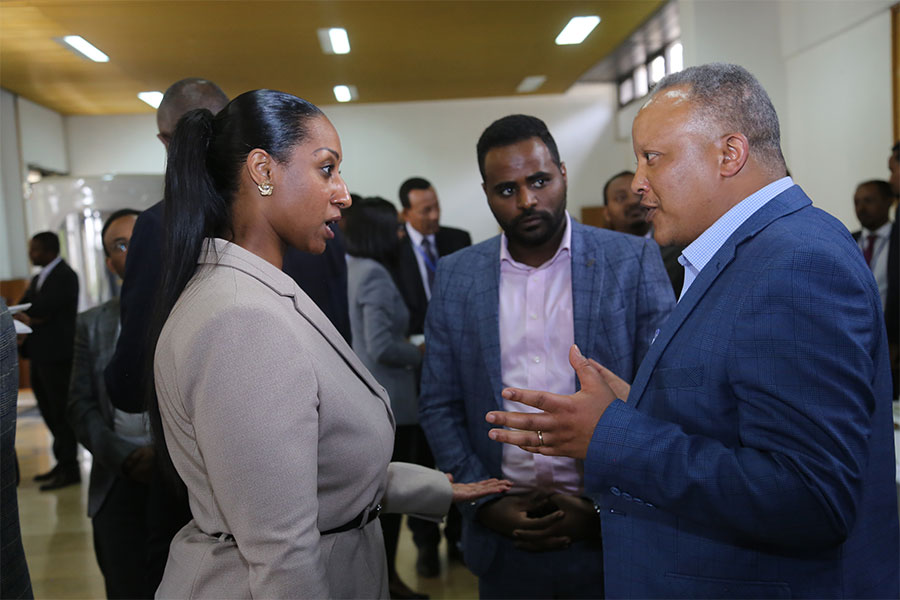
Radar | Apr 22,2022
Dec 5 , 2018
The Agricultural Transformation Agency (ATA) is set to build a national soil information system in a bid to collect, store, interpret and disseminate information about soil found in Ethiopia at an estimated cost of five million Br.
When operational after six months, the databases will be accessed through a website and an application and will provide soil information to farmers, extension workers and interested individuals.
The system will identify the GPS location and analyse the soil type found in that specific area and provide information on 22 soil parameters like PH level, texture, structure and various elements and compounds.
“Currently, there is no centralised database regarding soil,” said Tegabu Belete, project team leader at Ethiopian Soil Information System Project. “The new system aims at integrating existing information regarding soil.”
The National Soil Information System will also analyse the information and give feedback like fertiliser and soil use recommendations.
The current soil map of Ethiopia was built in 1970. The map was done with very few soil samples and is limited.
“For the past 50 years Ethiopia has been using two types of fertilisers, Urea and Diammonium Phosphate (DAP), without any study or impact assessment on soil,” said Tegbaru. “The major goal we want to achieve with this system is soil-based fertilizer use.”
Currently, the Agency is in the process of hiring an IT firm to develop and design the information system.
“We have completed collecting the necessary information and bought the infrastructure needed to implement the system,” said Tegbaru “We only need an IT firm to design and build us the framework where the soil information can be accessed.”
On October 27, 2018 the Agency floated a tender for an international bid. The bid closed on November 12, and the agency is now in the process of evaluating the technical capabilities of 13 companies that submitted their.
The Agency floated a national tender for the first time in 2017.
“The national tender was cancelled as the local firms did not meet the technical standard,” Tigabu told Fortune. “That’s why we now opened the bid for international firms.”
The Agency plans to finalise and hire the firm in two months and launch the first phase of the system in six months.
The data system is the final phase of a 10-million-dollar project funded by USAID and the World Bank and implemented by the Agency for the past six years.
The project so far has collected 80,000 soil samples from 18,000 rural and semi-agricultural kebeles across the country.
The sampled soils were then analysed at local soil testing and international laboratories.
One of the local soil testing centres that participated in the project is the National Soil Research Center.
“We have been providing input for the new system and analysed the soil samples,” said Fikre Mekuria, director of the centre.
The Agency also used to work with a local private soil testing laboratory called Horticoop Ethiopia Horticulture Plc.
"As we are a local company that gives standardised soil tests, we can save foreign currency," said Tomas Dano, general manager of the company.
Based on the results from the analysis, the Agency interprets and disseminates information for users.
"We have also been distributing hard prints of our study and research to weredas so that such information can also be accessed offline too," said Fikre.
The nearly decade-old Agricultural Transformation Agency was established with the goal of removing constraints on agricultural development and supporting smallholder farmers through research, innovation and technology.
After the completion of the soil testing system, the Agency will transfer its responsibilities and system to the Ethiopian Soil Resource Institute. Now under formation, the newly established institute is mandated to deal with all soil-related issues in Ethiopia.
The agricultural sector accounted for 34pc of GDP in 2017. However, the industry has been characterised by low productivity, mainly due to low soil fertility, an absence of balanced fertilisation and relevant soil management.
An expert with over a decade of experience on agriculture and environmental science believes the soil information system is a significant step forward for the revitalisation of the soil management system.
“The major problem when it came to farmers and soil use was a lack of knowledge about nutrients found in their soil,” said Solomon Addisu (PhD). “Such systems make the information accessible.”
But he notes that the information given to the farmers is pointless if the state doesn’t back it up with supplies and chemicals.
PUBLISHED ON
Dec 05,2018 [ VOL
19 , NO
971]

Viewpoints | Nov 02,2024

Fineline | Oct 03,2020

Fortune News | Mar 07,2020

Radar | Sep 08,2024

Radar | Sep 18,2021

Dec 22 , 2024 . By TIZITA SHEWAFERAW
Charged with transforming colossal state-owned enterprises into modern and competitiv...

Aug 18 , 2024 . By AKSAH ITALO
Although predictable Yonas Zerihun's job in the ride-hailing service is not immune to...

Jul 28 , 2024 . By TIZITA SHEWAFERAW
Unhabitual, perhaps too many, Samuel Gebreyohannes, 38, used to occasionally enjoy a couple of beers at breakfast. However, he recently swit...

Jul 13 , 2024 . By AKSAH ITALO
Investors who rely on tractors, trucks, and field vehicles for commuting, transporting commodities, and f...

Jul 12 , 2025
Political leaders and their policy advisors often promise great leaps forward, yet th...

Jul 5 , 2025
Six years ago, Ethiopia was the darling of international liberal commentators. A year...

Jun 28 , 2025
Meseret Damtie, the assertive auditor general, has never been shy about naming names...

Jun 21 , 2025
A well-worn adage says, “Budget is not destiny, but it is direction.” Examining t...